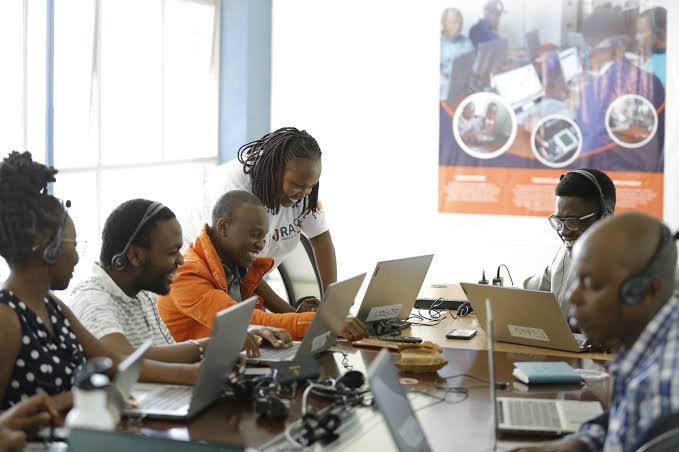By Jackie Adhyambo
Aside from the unrelenting hustle and bustle of Nairobi in between the hum of matatus and numberless city dwellers, milling around, many of them with smartphones in hand, a quiet revolution is being stitched. This inceptive revolution is a Wi-Fi-powered novelty run by graduates of grit and young individuals well versed in digital dojos.
Yes, Kenya’s youth are facing a broad canvas of unemployment statistics but a good number of them are refusing to subscribe to the brush of despair.
Instead, they are picking up the nimble needles of skill-based education and threading them through the vast, flowing tapestry of the gig economy, crafting livelihoods and building wealth on their own terms, though quietly.
Gone are the days when a singular university degree was a golden ticket. Today, the currency of opportunity is more about mastery in modern-day means of engagement.
It is about a young woman in Nakuru, her fingers flying across a graphics tablet, mastering design through online platforms. Her classroom? Global. Her clients are from Berlin and Bangalore. This is the essence of the new wealth creation where applied knowledge meets agile and transformative platforms.
Think of initiatives like Kuza Biashara, now showcasing their vibrant crafts on Instagram and Etsy, their customer base swelling beyond the local market and touching discerning buyers in New York or Tokyo. The gig economy is not a side-hustle. It is the mainstreaming of micro-entrepreneurship.
Kenya’s boda-boda riders, increasingly tech-literate, are poised for a similar evolution, moving beyond transport to deliveries, payments, and information services. Skill-based education provides the strong warp threads for this new fabric.
Institutions like the Technical University of Kenya (TUK), numerous TVETs across counties like Kisumu and Mombasa, and innovative coding boot camps like Zalego Academy are shifting focus and redefining our tech-driven world.
They teach more than theory to rope in tangible, market-aligned skills. Access to a smartphone and affordable data becomes the loom. Platforms like YouTube offer free tutorials on everything from advanced Excel to crochet patterns.
M-Pesa, Kenya’s world-leading mobile money system provides vital financial plumbing, allowing seamless payment for gigs, a micro-payment revolution echoing the success of mobile money across Africa, from Ghana’s MTN Mobile Money to Tanzania’s Vodacom M-Pesa.
This infrastructure allows a young farmer in Kakamega, trained via AgriTech digital platforms on soil analysis and market pricing to consult for other smallholders remotely, monetising localised knowledge and empowering many.
As young Kenyans build the future, there is a graphic designer in Thika collaborating with a programmer in Malindi and a writer in Kisii on a global project, paid via PayPal.
They are the certified solar technicians trained at a local TVET, installing systems in off-grid homesteads. Meanwhile, there are virtual assistants in Nyeri managing schedules for executives in Nairobi and London.
This is wealth built stitch by digital stitch, stream by gig stream. It is wealth defined not just in shillings, but also in autonomy, flexibility, and the profound satisfaction of creating value with honed skill. It requires initiative, relentless learning, and digital fluency. But for the agile, the skilled, and the connected, the tools are there. The loom is set.
Yes, Kenya’s youth are facing a broad canvas of unemployment statistics but a good number of them are refusing to subscribe to the brush of despair.
Instead, they are picking up the nimble needles of skill-based education and threading them through the vast, flowing tapestry of the gig economy, crafting livelihoods and building wealth on their own terms, though quietly.
Gone are the days when a singular university degree was a golden ticket. Today, the currency of opportunity is more about mastery in modern-day means of engagement. It is about a young woman in Nakuru, her fingers flying across a graphics tablet, mastering design through online platforms. Her classroom? Global. Her clients are from Berlin and Bangalore.
The gig economy is not a side-hustle. It is the mainstreaming of micro-entrepreneurship.
Kenya’s boda-boda riders, increasingly tech-literate, are poised for a similar evolution, moving beyond transport to deliveries, payments, and information services.
As young Kenyans build the future, there is a graphic designer in Thika collaborating with a programmer in Malindi and a writer in Kisii on a global project, paid via PayPal.
They are the certified solar technicians trained at a local TVET, installing systems in off-grid homesteads. Meanwhile, there are virtual assistants in Nyeri managing schedules for executives in Nairobi and London.
This is wealth built stitch by digital stitch, stream by gig stream. It is wealth defined not just in shillings, but also in autonomy, flexibility, and the profound satisfaction of creating value with honed skill. It requires initiative, relentless learning, and digital fluency. But for the agile, the skilled, and the connected, the tools are there. The loom is set.
Kenya’s youth are not just seeking job opportunities; they are forging economic futures, weaving vibrant, resilient livelihoods from the potent threads of skill and the boundless opportunities of the gig age. The pattern is yours to create.
Adhyambo is a Nakuru-based knowledge management consultant.

